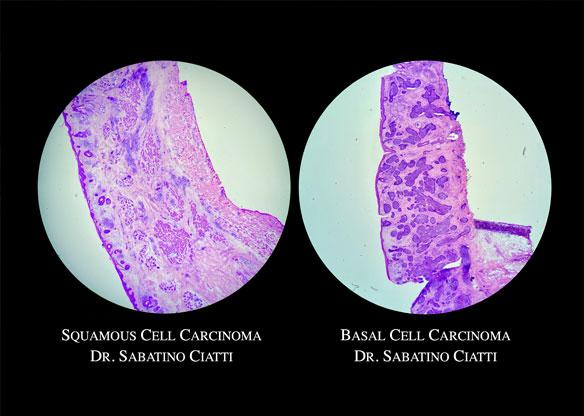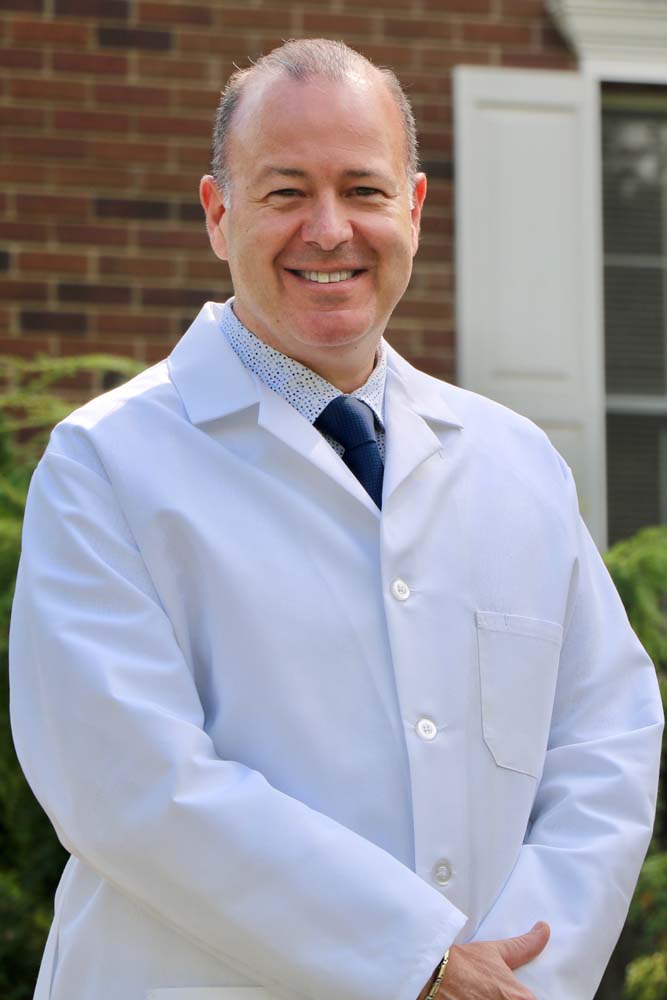What is Mohs Surgery?
Mohs micrographic surgery is an advanced surgical technique that offers the highest cure rate for skin cancer. Mohs surgery is primarily used in the removal of basal cell and squamous cell carcinomas. In Mohs surgery, the physician serves as surgeon, pathologist and reconstructive surgeon. Sabatino Ciatti MD, FAAD, FACMS is the leading fellowship-trained Mohs Surgeon in New Jersey with over twenty-five years of experience. When treating a patient, he uses the precision and accuracy of the microscope to trace skin cancer down to its root and ensure its removal. With masterful techniques, Dr. Ciatti then reconstructs the surgical defect and often creates award-winning cosmetic results.
What is Mohs Surgery?
Mohs micrographic surgery is an advanced surgical technique that offers the highest cure rate for skin cancer. Mohs surgery is primarily used in the removal of basal cell and squamous cell carcinomas. In Mohs surgery, the physician serves as surgeon, pathologist and reconstructive surgeon. Sabatino Ciatti MD, FAAD, FACMS is the leading fellowship-trained Mohs Surgeon in New Jersey with over twenty-five years of experience. When treating a patient, he uses the precision and accuracy of the microscope to trace skin cancer down to its root and ensure its removal. With masterful techniques, Dr. Ciatti then reconstructs the surgical defect and often creates award-winning cosmetic results.
What is Mohs Surgery?
Mohs micrographic surgery is an advanced surgical technique that offers the highest cure rate for skin cancer. Mohs surgery is primarily used in the removal of basal cell and squamous cell carcinomas. In Mohs surgery, the physician serves as surgeon, pathologist and reconstructive surgeon. Sabatino Ciatti MD, FAAD, FACMS is the leading fellowship-trained Mohs Surgeon in New Jersey with over twenty-five years of experience. When treating a patient, he uses the precision and accuracy of the microscope to trace skin cancer down to its root and ensure its removal. With masterful techniques, Dr. Ciatti then reconstructs the surgical defect and often creates award-winning cosmetic results.
What is Skin Cancer?
In the United States skin cancer is the most commonly diagnosed form of cancer. With an estimated 1,000,000 new cases every year, skin cancer is highly common and can affect anyone. The three most common types of skin cancer are basal cell carcinoma, squamous cell carcinoma, and melanoma.
Basal Cell Carcinoma
This is the most common form of skin cancer. Basal cells reside in the deepest layer of the epidermis, along with hair follicles and sweat ducts. When a person is overexposed to UVB radiation, it damages the body’s natural repair system, which causes basal cell carcinomas to grow. These tend to be slow-growing tumors and rarely metastasize (spread).
Squamous Cell Carcinoma
Squamous cells are found in the upper layer (the surface) of the epidermis. They look like little fish scales under a microscope and present as a crusted or scaly patch of skin with an inflamed, red base. They are often tender to touch. It is estimated that 250,000 new cases of squamous cell carcinoma are diagnosed annually, and that about 1 percent of these cases are fatal.
Melanoma
Although melanoma is the least common type of skin cancer, it is by far the most dangerous. Melanomas occur in melanocytes which are the cells responsible for the pigment of your skin. That’s why melanomas often look like little dark brown or blacks spots on the skin. When melanomas are discovered and treated early, they are nearly 100% curable. For many of our patients, we recommend frequent full body skin checks.
What to expect with Mohs
Mohs surgery relies on the physician serving as surgeon, pathologist, and reconstructive surgeon to treat basal cell and squamous cell carcinoma skin cancers. The process involves Dr. Ciatti excising the clinical obvious portion of the skin cancer and then checking how far the cancer extends under the microscope. After the cancer is successfully excised, Dr. Ciatti creatively and expertly reconstructs the surgical wound. Oftentimes, Dr. Ciatti’s patients compliment him on the flawlessness of his cosmetic results.
What to expect with Mohs
Mohs surgery relies on the physician serving as surgeon, pathologist, and reconstructive surgeon to treat basal cell and squamous cell carcinoma skin cancers. The process involves Dr. Ciatti excising the clinical obvious portion of the skin cancer and then checking how far the cancer extends under the microscope. After the cancer is successfully excised, Dr. Ciatti creatively and expertly reconstructs the surgical wound. Oftentimes, Dr. Ciatti’s patients compliment him on the flawlessness of his cosmetic results.
What to expect with Mohs
Mohs surgery relies on the physician serving as surgeon, pathologist, and reconstructive surgeon to treat basal cell and squamous cell carcinoma skin cancers. The process involves Dr. Ciatti excising the clinical obvious portion of the skin cancer and then checking how far the cancer extends under the microscope. After the cancer is successfully excised, Dr. Ciatti creatively and expertly reconstructs the surgical wound. Oftentimes, Dr. Ciatti’s patients compliment him on the flawlessness of his cosmetic results.
Frequently Asked Questions
There are a range of known causes for skin cancer. When you come in for your visit, be sure to ask Dr. Ciatti if you are curious about the causes of skin cancer and prevention strategies.
- Sunlight and Sunburns
The single most significant predisposing factor for the development of skin cancer is excessive sun exposure. This is why a lot of skin cancers tend to appear on the face and other exposed parts of the body. Ultraviolet rays can be organized into three categories: UVA, UVB, UVC. UVA rays were once thought to primarily contribute to aging and wrinkles. Now research shows that both UVA and UVB rays contribute to the formation of skin cancers. Because skin cancers grow slowly, it may take 20 years or more to develop a skin cancer from a sunburn you got years prior. Dr. Ciatti recommends premium broad-spectrum sunscreen, which can be found at our practice and medspa. - Heredity
There is a lot of dermatology research suggesting that skin cancer might have a hereditary factor. This explains why some families have a history of skin cancer. Melanoma in particular has a very strong hereditary component. From our experience, that is why young people are often affected by melanoma.If you inherited fair skin from your family, you are probably more prone to the effects of the sun than people with darker skin tones. This doesn’t mean that people with darker skin tones don’t get skin cancer. Be sure to slather on broad-spectrum sunscreen and protect your skin from excessive sun exposure. - Environment
People living at higher altitudes or near the equator are exposed to higher levels of ultraviolet light. This results in higher rates of skin cancer for people who live in these conditions. Skin cancers can also be caused by chemical carcinogens. - Other Known Causes
Research suggests that some superficial X-rays that treat certain skin disorders, like acne, can cause skin cancer years later. However, chest X-rays and dental X-rays are not known to cause skin cancer. Burns, scar trauma, and certain rare inherited diseases are also known to sometimes cause skin cancer.
If you develop any of the signs or symptoms of a skin cancer (i.e. a non-healing growth or a changing mole), Dr. Ciatti recommends a biopsy of the growth. A biopsy will determine if you have skin cancer and what kind of skin cancer it may be. A biopsy is performed with local anesthesia (an injection). Since a biopsy only removes the superficial portion of the growth, you will require surgery if the growth is in fact skin cancer.
Dr. Ciatti is a fellowship-trained Mohs surgeon with over twenty-five years of successful surgeries. He is a leading expert on the treatment of skin growths and skin cancers, and will provide compassion and comprehensive care from consultation to surgery and beyond. With his mastery of excising skin cancer and reconstructing surgical defects, Dr. Ciatti is renowned for his award-winning surgical reconstructions and professionalism.
If you develop any of the signs or symptoms of a skin cancer as discussed above (i.e. a non-healing growth, or a changing mole), you should have the growth evaluated. Often you will need a skin biopsy to verify that it is (or isn’t) a skin cancer. A biopsy will also determine the type of skin cancer. The biopsy is performed with local anesthesia (an injection), and only removes the superficial portion of the skin cancer. If the biopsy confirms that there is skin cancer, it will need to be completely removed, usually by surgery. Sometimes the biopsy site will heal over and appear as though the skin cancer is gone; however, the “roots” of the skin cancer are still there and if it is not totally removed, it will grow again, often larger than the initial growth.
At Advanced Dermatology, Mohs & Laser Surgery Center, Dr. Ciatti offers unmatched expertise in treating skin cancers, ensuring their removal, and masterfully reconstructing the resulting surgical defects. The majority of treatments for skin cancer are surgical.
Dr. Ciatti will assess your unique skin, and make a decision based on the size of the cancer, location of the cancer, type of cancer, and history of your previous therapies.
Treatments for Skin Cancer
- Simple excision (Cutting and Suturing)
- Curettage and electrodessication (Scraping and burning with an electric needle)
- Mohs micrographic surgery (microscopically controlled excision).
- Radiotherapy (x-ray)
Although any of the above methods can be used to treat basal and squamous cell carcinomas, Mohs micrographic surgery is by far the most superior. Mohs surgery offers the highest cure rate (up to 99%), the lowest chance of regrowth, the lowest potential for scarring and disfigurement, and the most exact and precise means of removal (only skin cancer is removed, normal tissue is spared). Melanomas are almost always treated by wide-excision. However, some melanomas in sensitive cosmetic areas can be treated with Mohs surgery.
Many peer-reviewed studies have shown links between skin cancer, heredity, and frequency. So, if you have had skin cancer, you shouldn’t rule out that you can’t get another one. Follow these Do’s and Don’ts to help
- Avoid direct sun exposure.
- Do frequently check your body for irregular growths. If you have any irregular growths, schedule an appointment with your dermatologist to get a skin check.
- Wear broad-spectrum sunscreen daily (SPF 40 or higher) — even on overcast days. Also be sure to wear sunscreen at higher altitudes. We carry a variety of premium broad-spectrum sunscreens at our practice.


Who is Dr. Sabatino Ciatti?
Sabatino Ciatti, MD, FAAD, FACMS is a highly experienced, board-certified dermatologist and dermatologic surgeon who specializes in Mohs micrographic surgery. Dr. Ciatti is a fellowship-trained Mohs surgeon, and is a leading expert on the treatment of skin growths and skin cancers. With his mastery of excising skin cancer and reconstructing surgical defects, Dr. Ciatti is renowned for his award-winning surgical reconstructions and attention to detail.
Dr. Ciatti has published research in a wide array of publications, such as the Journal of the American Academy of Dermatologyand Dermatologic Surgery, and has been honored by many esteemed organizations, such as America’s Top Surgeons, Professional Who’s Who, New Jersey Physician, and NJ Top Docs.
In 2020, Dr, Ciatti was honored by Plastic Surgery Select for his expertise in Mohs Surgery and post-Mohs reconstruction.
Schedule Your Appointment
For more information about Mohs Surgery, please make an appointment. Dr. Ciatti is ready to help you.

Schedule Your Appointment
For more information about Mohs Surgery, please make an appointment. Dr. Ciatti is ready to help you.

Schedule Your Appointment
For more information about Mohs Surgery, please make an appointment. Dr. Ciatti is ready to help you.


